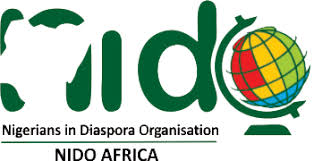
******NIDO Africa Intensifies Fight Against Human Trafficking, Addresses Migrant Crisis in African countries
The Nigerians in Diaspora Organisation (NIDO) Africa recently convened a crucial interactive session to address the escalating crisis of human trafficking and the plight of Nigerian migrants in various African countries. The discussion, led by key figures from NIDO Africa and beyond, focused on outlining strategies to combat these pressing issues, marked by sobering realities and calls for urgent action.
Professor Jude Osakwe, Continental Chairman of NIDO Africa, spearheaded the discussion, detailing the organization’s multifaceted approach to tackling human trafficking. Initiatives include the launch of the “Save our Children” campaign, the distribution of educational materials in schools to raise awareness, and direct rescue operations in vulnerable regions such as Ghana, Mali, and Senegal.
Reverend Dr. Ebenezer Alabi, Vice Chairman, External Affairs, provided a grave assessment of the situation in Ghana, emphasizing the immense challenges in prosecuting traffickers and ensuring the safe repatriation of victims. Both speakers stressed the critical need for bolstered resources, stricter legislation, and increased government commitment to combat this heinous crime effectively. A key proposal emerging from the session was to engage with the Nigeria National Assembly and President to elevate awareness and push for stricter measures against human trafficking.
Hon. Mark Akuma highlighted the desperate circumstances of Nigerian migrants in Tunisia, revealing that a staggering 99% entered the country illegally, often using it as a transit point to reach Europe. He described appalling living conditions in makeshift settlements and the pervasive involvement of traffickers, with some cases involving parents exploiting these vulnerable migrants. Akuma emphasized the need for immediate attention and amplified resources, citing challenges such as the absence of direct flights for repatriation and the overburdened capacity of the Nigerian Embassy in Tunisia. He commended the decision of NIDO Africa to establish a vocational center in Nigeria to provide viable alternatives for returnees, but cautioned that unless conditions in Nigeria improve, migrants may be compelled to return to Tunisia.
The meeting also addressed broader challenges faced by the African diaspora, including drug trafficking, and the need for collective action. Dr. Chika Emmanuel, President of NIDO Brazil, underscored the importance of engaging with the Nigerian Presidency and other key stakeholders to garner support and raise awareness.
NIDCOM Chairman, Dr. Abike Dabiri, was commended for her proactive response in handling these issues, underscoring NIDCOM’s commitment to safeguarding the welfare of Nigerians in the diaspora and actively combating human trafficking.
Dr. Sulayman from Uganda discussed the nation’s efforts to combat human trafficking through enhanced government monitoring, advocating for amendments to migration laws, and emphasizing the importance of improving Nigeria’s power supply to deter migration.
A central concern remained the plight of vulnerable minors, with Hon. Akuma raising the alarm about two Nigerian minors trapped in Tunisia. Professor Osakwe echoed these concerns, emphasizing the need for collective action to pressure embassies to act swiftly in protecting vulnerable citizens abroad.
Chief Calistus Elozieuwa, Chairman Board of Trustees, NIDO Ghana, highlighted his personal involvement in facilitating the return of 76 individuals to Nigeria and pursuing legal action against 40 suspected traffickers, resulting in 13 convictions thus far. He explained the deceptive nature of trafficking, often facilitated through social media and local networks within Nigeria.
The discussion also shed light on the disturbing business aspects of human trafficking, revealing the financial incentives for traffickers and the exploitation of victims for financial gain by various stakeholders. Successful prosecution of traffickers was underscored as crucial, dependent on victims being available to provide evidence.
The meeting concluded with a strong call for increased government support for anti-trafficking efforts, including adequate funding for shelters and victim support. Participants emphasized the need for increased awareness campaigns in schools and churches, as well as targeting traffickers by planting informants. A key takeaway was the agreement to launch a media campaign to advocate for the release of the minors trapped in Tunisia and to release a comprehensive report summarizing the discussions and proposed solutions.
NIDO Africa has reaffirmed its commitment to continue fighting tirelessly against human trafficking and supporting vulnerable Nigerian migrants across the continent.